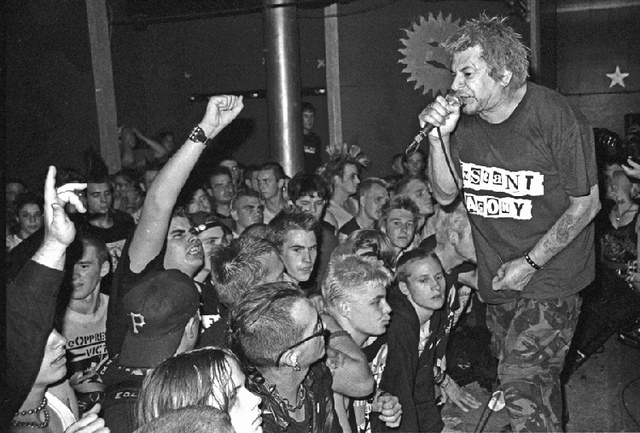It’s difficult, if not impossible, to encapsulate an entire life story, artistic movement or historical era in 90 minutes or so. Thankfully, Punk’s Not Dead , an energetic new music documentary by
Susan Dynner, doesn’t really make the attempt. Instead of trying vainly to be the end-all, be-all of punk rock filmmaking, this short, sharp doc acts as more of an endearing tribute to the (as yet) undying spirit of punk.
The film begins with the briefest of history lessons, taking us back to those early days in the mid-’70s when pioneering punks like the
Sex Pistols, the
Ramones and the
Buzzcocks were igniting an underground youth movement. But rather than providing a simple, linear history of the punk rock genre (like Paul Rachman’s
American Hardcore ),
Punk’s Not Dead uses a handful of historical touchstones to launch a semi-philosophical debate about what is and is not punk rock, eventually working its way up to the titular declaration. A massive collection of musicians, concert promoters and record label owners are interviewed here. What’s most interesting, though, is not the rare old concert footage (there’s plenty) or the interviews with elder statesmen like John Doe of X, Joey Shithead of DOA and Henry Rollins of Black Flag (of course), but the deliberate comparing and contrasting of old and new school. The film highlights the late ’80s when the newly reformed Bad Religion and relative newcomers like Rancid, Green Day and The Offspring initiated the “melodic hardcore” movement. Suddenly, punk rock was hot again and rapidly encroaching on the mainstream. Does this make punk rock successful or a total sellout? Do things like Hot Topic clothing stores and the Warped Tour bring punk rock music and culture to a wider audience or do they reduce it to just another commercial commodity? Plenty of people sound off in the argument, and Punk’s Not Dead provides cogent arguments for both sides of this great divide. Of course, the resurgence of punk rock in the ’80s gave birth to today’s ultra-popular pop-punk bands like Good Charlotte, Sum 41 and My Chemical Romance. Are these guys punk? Punk’s Not Dead does get in a few good jabs at these poster boys, but it doesn’t thoroughly denigrate them. (Although Captain Sensible of The Damned is happy to wave his arse in their general direction.) Perhaps a little meaner spirit might have matched the punk ethos more closely, but Susan Dynner (who grew up in D.C. listening to Minor Threat and working for Dischord Records) is clearly pushing a “big tent” approach when it comes to music. Of course, one of the major reasons for being here is the music itself, and Punk’s Not Dead doesn’t scrimp. Like American Hardcore , it features no full-length stage performances, but the filmmakers seem to have gotten plenty of support from the labels and there’s wall-to-wall music, both old and new to be savored. Stylistically, the film is full of energy, mixing brief interviews, concert footage, animation and even some hilarious dated episodes of “Quincy, M.E.” and “CHiPs” detailing the mainstream media’s not-so-enlightened attitude toward the punk rock menace.To be sure, there are missed opportunities. Just about any music fan in the audience can shout out the name of a favorite band who got left off the invite list. It might also have been nice to dig into some deeper issues, perhaps comparing ’70s punk rock politics (the Dead Kennedys’ “California Über Alles,” maybe) to Bush-era protest tunes (Green Day’s poli-sci concept album American Idiot ).
Still, the best parts of this film are the sections that confirm the title declaration. Although it seems like there’s a major gap between the time the Ramones burst onto the scene and
Nirvana arrived, punk rock never truly went away. It’s heartening to see bands like
GBH,
Still Little Fingers,
Social Distortion,
U.K. Subs, the
Subhumans and
The Adicts–all of whom have been together for 30 years or more and are still out there happily touring the globe.
Punk’s Not Dead brings up plenty of topics of discussion for the musically minded ( Que es mas hardcore? ), but it tries to end on a high note, exploring DIY videos sent to the filmmakers from young, upcoming bands all over the world. It’s reassuring proof that there were, are and always will be angry teenagers in basements–maybe in Los Angeles, maybe in Uruguay–playing music that is, to borrow the vernacular, “punk as fuck.”

